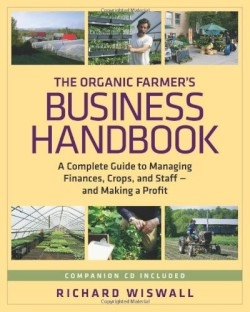The Organic Farmer's Business Handbook
A Complete Guide to Managing Finances, Crops and Staff - and Making a Profit
“Sometimes I think should have listened to my parents and become a doctor or a lawyer-but you know, I don’t think I could take the pay cut.” So begins Wiswell’s helpful manual on the business end of farming.
Wiswell himself farmed-and struggled financially-for many years before realizing that he wanted more economic security. Now, he says, he risks “becoming known as an UBCOF: an Ãœber Bean Counting Organic Farmer.” He still farms, but now he does so with a good understanding of his costs of production, his income, and how he should most profitably spend his time. He encourages farmers to work smarter, and his book contains not only his spreadsheets and planning tools, but an overall framework for creating a financially sound and profitable farm.
If you’re not a farmer, this is an essential introduction to the complexities of the business. An organic farm is not one enterprise, but a collection of several enterprises-perhaps eggs, meat chickens, vegetables for market, and specialty greens for a restaurant-with varying degrees of profitability.
If you’re already farming, this book is a one-stop guide that runs you through Wiswell’s planning process. Starting with clarifying what you personally need from your farm, these pages move step-by-step through crop enterprise budgets, profit goals, marketing plans, production plans, field maps, and seedling calendars. Wiswell is a practical man, and knows that implementing systems for tracking inventory in the free-for-all of a farmer’s market, for example, can seem impossible. Perhaps heeding farmer and essayist Wendell Berry’s advice that “elegance is born of constraint,” Wiswell’s suggestions are simple. To track labor expenses per crop, make a Crop Journal from a basic pocket folder with loose-leaf pages inside, one page for each crop, and write down every time a task-weeding, mulching, cultivating-is performed on a crop. When the season winds down, you will have what you need to run the numbers.
Wiswell isn’t afraid of humble details; he includes briefly described strategies for organizing your checkbook system, bill paying schedules, and the papers in your office. Neither does he shy away from one of the most pressing and painful financial issues for contemporary farmers: how to retire without having to sell the farm. Material on employee management, production efficiency, and writing a business plan is included, as well as a companion CD with spreadsheet templates. It’s all here.
“If I offered you a job requiring two days’ work and paid you $10,000, you’d be hard-pressed not to take it. That’s what I paid myself the first year I [planned].” With that kind of return, Wiswell’s book is not only a sound investment; at its price, it’s a steal.
Disclosure: This article is not an endorsement, but a review. The publisher of this book provided free copies of the book to have their book reviewed by a professional reviewer. No fee was paid by the publisher for this review. Foreword Reviews only recommends books that we love. Foreword Magazine, Inc. is disclosing this in accordance with the Federal Trade Commission’s 16 CFR, Part 255.

